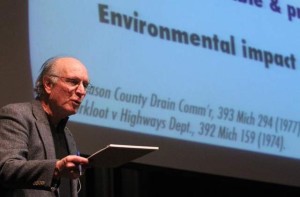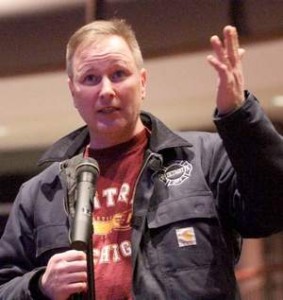
Click here to read the article on LivingstonDaily.com
‘A lot at stake’ for locals regarding fracking rules
Environmental group discusses options at Fowlerville meeting
A note from FLOW Chair Jim Olson to clarify – At the meeting, FLOW did say townships could undertake a ban, however we specified that it would be difficult to defend a ban, although you cannot preclude some circumstances where it may well be proper, because there is no place suitable where it could occur. But it is more likely, and better, that these issues and concerns are based on a case-by-case review through a zoning special use permit or other similar proceeding under the zoning or a police power ordinance.
By Christopher Behnan
February 6, 2014
FOWLERVILLE, MI – Local governments can use existing law and amend their own rules to regulate — if not outright ban — hydraulic fracturing in their backyards, For Love of Water representatives told local officials Thursday.
For Love of Water, or FLOW, was hired by Conway Township to discuss local rights after a Texas oil giant was permitted to inject 3 million gallons of water, sand and chemicals to maximize the potential recovery of natural gas at a local farm property.
FLOW Chairman Jim Olson said Michigan’s Zoning Enabling Act — which does not allow prohibition of drilling projects — empowers local governments to regulate everything from noise, hazardous materials and air pollution, to chemical mixing, storage and pumping activities at drilling sites.

Jim Olson, chairman of For Love of Water, explains the possible legal approaches that might be taken to regulate hydraulic fracturing, or ‘fracking,’ Thursday evening at the Alverson Center for Performing Arts at Fowlerville High School. / ALAN WARD/DAILY PRESS & ARGUS
Olson said local governments also can require environmental-impact statements and bonding for some activities, and address concerns such as lighting and dust control on local roads.
“Local communities have a lot at stake, and the question we started asking about a year-and-a-half ago was, ‘What can local units do?’ ” Olson explained.
“This is all basic stuff to address what is coming,” he added.
Local governments, in defending the public’s health and safety, could have legal standing to ban or place moratoriums on fracking but would face much bigger legal challenges, Olson added.
Just over 100 people attended Thursday’s session, which was intended to educate local leaders on high-volume hydraulic fracturing and their legal ability to regulate drilling-related activities in their communities.
FLOW will ultimately deliver a legal analysis based on Conway Township’s concerns, then leave it to the township attorney to draft ordinances.
FLOW Executive Director Liz Kirkwood said the Conway site is one of 52 permitted projects that allow high-volume fracturing to tap oil or natural gas reserves.
Kirkwood said large volumes of local water usage for projects and hauling of “flowback” water from wells should be of top concern to local leaders.
“This is just another industrial use that is coming to your town,” Kirkwood said.

Cohoctah Township resident Arnie Nowicki asks a question about water quality during Thursday evening’s meeting in Fowlerville. / ALAN WARD/DAILY PRESS & ARGUS
John Simaz, a spokesman for the oil and gas industry, accused FLOW of using “backdoor” methods to attack a decades-old, environmentally safe practice that creates jobs and boosts the economy.
Olson noted that high-volume projects only emerged in Michigan a few years ago.
About 20 wells have been drilled in Michigan using high-volume hydraulic fracturing over the past few years.
Texas-based GeoSouthern Energy Corp. in September was issued the high-volume drilling permit in Conway.
GeoSouthern’s permit allows the company to drill about 4,400 feet into the ground and about 1 mile horizontally into a geological formation known as A-1 carbonate starting on resident Jack Sherwood’s farm property off Fowlerville Road.
Sherwood has said he doesn’t expect the process to yield much. His farm property has been drilled three other times over the past 30 years, and in all cases, the drills came up dry.
GeoSouthern to date has drilled an exploratory well and is awaiting results of rock samples that will determine whether there is enough product to justify the expense of hydraulic fracturing.
Results of the samples aren’t expected for at least another three weeks.
Contact Daily Press & Argus reporter Christopher Behnan at 517-548-7108 or at cbehnan@gannett.com. Follow him @LCLansingGuy on Twitter.
